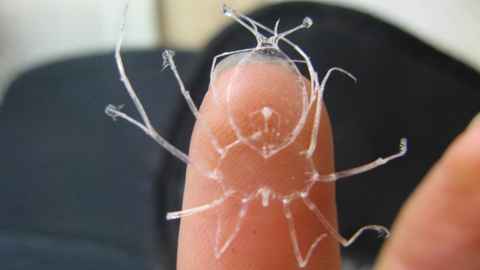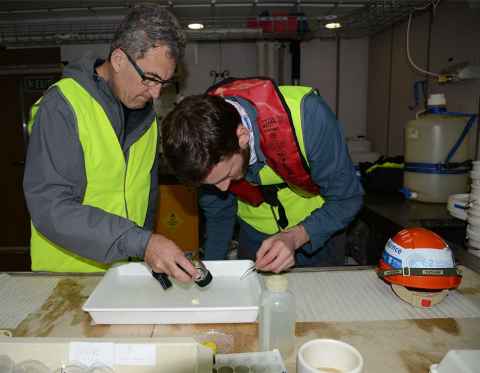Marine research reveals powers of invisibility
28 May 2019
Living in the clear waters of the open ocean is a perilous business when you are a small swimming organism because there is nowhere to hide.

Living in the clear waters of the open ocean is a perilous business when you are a small swimming organism because there is nowhere to hide.
So marine creatures have evolved a clever way to overcome the lack of hiding places – they have evolved to become invisible, so completely transparent that they are almost impossible to spot in the open ocean.
Professor Andrew Jeffs from the University of Auckland’s Institute of Marine Science is studying these small transparent sea creatures aboard a month-long research expedition of the RV Investigator. The ship is sailing off the coast of Western Australia in the Indian Ocean, one of the most remote stretches of water on Earth where the seafloor is often 5 kilometres beneath the surface.
Professor Jeffs’ work involves capturing different types of small transparent ocean organisms in nets and using laser beams to measure how well their bodies match the optical properties of surrounding seawater in order to achieve transparency.
Many different ocean organisms including fish, crustaceans, worms, jellyfish and squid are transparent but despite its prevalence among marine creatures, both in prey animals and predators, it is not well understood.
“In some areas of the open ocean, over 90 percent of the organisms larger than a full stop are transparent,” he says. “Our research is focused on how these organisms achieve transparency which requires their body tissues to not absorb or bend light.”
Professor Jeffs describes the ship as a “floating, multidisciplinary university” where scientists and students from four countries are engaged in research on everything from tracking whales, monitoring seabirds and studying water currents to mapping the seabed and calibrating sea measurements by satellite.
With technicians and other crew, the Investigator has 60 people on board working 12-hour shifts around the clock.
“The information pouring in on what is a relatively poorly understood ocean region is truly unbelievable. And then there are the unlooked-for moments of real excitement such as the ship picking up the underwater call of an Antarctic minke whale, a pretty unusual sound in this part of the world.”
The RV Investigator is carrying out oceanographic research along the 110°E meridian off the coast of Western Australia as part of the second International Indian Ocean Expedition. The voyage is led by Professor Lynnath Beckley of Murdoch University and is supported by the CSIRO Marine National Facility of Australia.

Media contact
Anne Beston | Media adviser
DDI 09 923 3258
Mob 021 970 089
Email a.beston@auckland.ac.nz